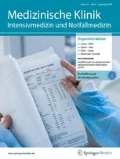Zusammenfassung
Die Expression und Aktivität des Protoonkogens src, einer Nicht-Rezeptor- Tyrosinkinase, sind eng mit der Entwicklung fortgeschrittener Malignome und einer schlechten Prognose assoziiert. Neun weitere Enzyme mit hoher Homologie zur src-Kinase sind zwischenzeitlich identifiziert und zur Familie der src-Kinasen („src family kinases“ [SFKs]) zusammengefasst worden. SFKs repräsentieren die größte Gruppe der Nicht-Rezeptor-Tyrosinkinasen und interagieren direkt mit vielen Rezeptor-Tyrosinkinasen, G-Protein-gekoppelten Rezeptoren, Signaltransduktormolekülen, Transkriptionsfaktoren sowie mit Molekülen, die an der Zelladhäsion und der Migration beteiligt sind. Diese Interaktionen begründen die Vielzahl der SFK-mediierten biologischen Funktionen wie Proliferation, Zellwachstum und -differenzierung, Zellmotilität und -migration, Angiogenese und zelluläres Überleben. In einigen Studien konnte gezeigt werden, dass die alleinige Überexpression der Wildtyp-src-Kinase nur eine sehr geringe onkogene Aktivität aufweist. Auch sind Mutationen, die zu einer permanenten src-Aktivierung führen, in humanen Tumoren selten, so dass die Rolle der SFKs für die Karzinogenese und die Tumorprogression gegenwärtig noch nicht völlig geklärt werden konnte. Allerdings wird vermutet, dass eine mögliche transformierende Aktivität der (überexprimierten) src-Kinasen die prokarzinogene Wirkung anderer Moleküle verstärken kann, da die SFKs mit einer Vielzahl anderer proonkogener Proteine und Liganden interagieren. SFKs und ihre Inhibitoren stellen daher ein attraktives molekulares Target für die Tumortherapie dar, was gegenwärtig weiterentwickelt wird. Obwohl inzwischen eine Vielzahl von src-Inhibitoren entdeckt wurde, befinden sich nur wenige in klinischer Prüfung. Erste Phase-II-Daten für Dasatinib, Bosutinib und Saracatinib haben belegt, dass diese src-Inhibitoren gut verträglich sind, allerdings zeigten sie nur eine geringe klinische Aktivität in der Monotherapie. Die weitere klinische Evaluierung wird deshalb auch Studien für die Kombinationstherapie umfassen.
Abstract
The proto-oncogene src encodes a nonreceptor tyrosine kinase whose expression and activity are correlated with advanced malignancy and poor prognosis in a variety of human cancers. Nine additional enzymes with homology to src have been identified and collectively are referred to as src family kinases (SFKs). SFKs represent the largest family of nonreceptor tyrosine kinases and interact directly with receptor tyrosine kinases, G-protein-coupled receptors, steroid receptors, signal transducers and activators of transcription, and molecules involved in cell adhesion and migration. These interactions lead to a diverse array of biological functions including proliferation, cell growth, differentiation, cell shape, motility, migration, angiogenesis, and survival. Studies investigating mutational activation of src in human cancers suggest that this may be a rare event and that wild-type src is weakly oncogenic. Thus, the role of src in the development and progression of human cancer remains unclear; however, it has been suggested that SFK activity may be linked to cancer progression and metastatic disease by facilitating the action of other signaling proteins. SFKs may therefore represent a promising therapeutic target. As a consequence, src-targeting therapies are a recent development. Although numerous agents have been discovered, few have reached clinical development. Amongst them, dasatinib, bosutinib and saracatinib are already in phase II testing and data from these trials suggest that these agents are well tolerated, however, they possessed little clinical activity as monotherapy. Future clinical development will therefore include trials of combination therapy.
Literatur
Brown MT, Cooper JA. Regulation, substrates and functions of src. Biochim Biophys Acta 1996;1287:121–49.
Parson SJ, Parson JT. Src family kinases, key regulations of signal transduction. Oncogene 2004;23:7906–9.
Cance WG, Craven RJ, Bergman M, et al. Rak, a novel nuclear tyrosine kinase expressed in epithelial cells. Cell Growth Differ 1994;5:1347–55.
Lee J, Wang Z, Luoh SM, et al. Cloning of FRK, a novel human intracellular src-like tyrosine kinase-encoding gene. Gene 1994;138:247–51.
Martin GS. The hunting of src. Nat Rev Mol Cell Biol 2001;2:467–75.
Fizazi K. The role of src in prostate cancer. Ann Oncol 2007;18:1765–73.
Cohn GB, Ren R, Baltimore D. Modular binding domains in signal transduction proteins. Cell 1995;80:237–48.
Cooper JA, Gould KL, Cartwirght CA, et al. Tyr527 is phosphorylated in pp60c-src: implications for regulation. Science 1986;231:1431–4.
Okada M, Nakagawa H. A protein tyrosine kinase involved in regulation of pp60c-src function. J Biol Chem 1989;264:2086–93.
Nada S, Okada M, MacAuley A, et al. Cloning of a complementary DNA for a protein-tyrosine kinase that specifically phosphorylates a negative regulatory site of p60c-src. Nature 1991;351:69–72.
Wheeler DL, Iida M, Dunn EF. The role of src in solid tumors. Oncologist 2009;14:667–78.
Biscardi JS, Ishizawar RC, Silva CM, et al. Tyrosine kinase signaling in breast cancer: epidermal growth factor receptor and c-src interactions in breast cancer. Breast Cancer Res 2000;2:203–10.
Irby RB, Mao W, Coppola D, et al. Activating src mutation in a subset of advanced human colon cancers. Nat Genet 1999;21:187–90.
Laghi L, Bianchi P, Orbetegli O, et al. Lack of mutations at codon 531 of src in advanced colorectal cancers from Italian patients. Br J Cancer 2001;84:196–8.
Ishizawar R, Parsons SJ. C-src and cooperating partners in human cancer. Cancer Cell 2004;6:209–14.
Hecker TP, Grammer JR, Gillespie GY, et al. Focal adhesion kinase enhances signaling through the Shc/extracellular signal-regulated kinase pathway in anaplastic astrocytoma tumor biopsy samples. Cancer Res 2002;62:2699–707.
Aguilera DG, Tsimberidou AM. Dasatinib in chronic myeloid leukemia: a review. Ther Clin Risk Manag 2009;2:281–9.
Johnson FM, Agrawal S, Burris H, et al. Phase 1 pharmacokinetic and drug-interaction study of dasatinib in patients with advanced solid tumors. Cancer 2010;116:1582–91.
Lu Y, Li X, Liang K, et al. Epidermal growth factor receptor (EGFR) ubiquitination as a mechanism of acquired resistance escaping treatment by the anti-EGFR monoclonal antibody cetuximab. Cancer Res 2007;67:8240–7.
Keller G, Schafhausen P, Brümmendorf TH. Bosutinib. Recent Results Cancer Res 2010;184:199–214.
Lara PN, Longmate J, Evans CP, et al. A phase II trial of the src-kinase inhibitor AZD0530 in patients with advanced castration-resistant prostate cancer. A California Cancer Consortium study. Anticancer Res 2009;20:179–84.
Bu Y, Gao L, Smolinski M, et al. KX01 (KX2-391), a src-family kinase inhibitor targeting the peptide-binding domain, suppresses oncogenic proliferation in vitro and in vivo. Proc Am Assoc Cancer Res 2008;2008:4983.
Linke R, Dempke W. Management of imatinib-resistant CML patients. Onkologie 2007;30:574–80.
Author information
Authors and Affiliations
Corresponding author
Rights and permissions
About this article
Cite this article
Dempke, W., Zippel, R. Src-Kinasen in der Tumortherapie. Med Klin 105, 711–715 (2010). https://doi.org/10.1007/s00063-010-1123-y
Received:
Accepted:
Published:
Issue Date:
DOI: https://doi.org/10.1007/s00063-010-1123-y

